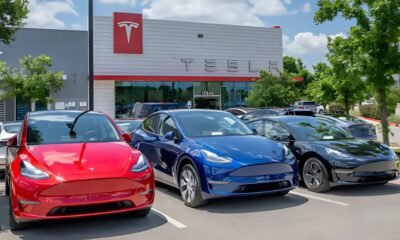Innovation
Tencent Eyes European Cloud Market with Gaming and WeChat Expertise

Tencent, one of China’s most dominant tech giants, is setting its sights on Europe — and it’s not coming empty-handed. With years of experience scaling WeChat and building top-tier gaming infrastructure, Tencent is now aiming to replicate its cloud computing success in the West, particularly in Europe’s highly competitive market.
According to Dowson Tong, CEO of Tencent’s cloud group, the company plans to lean heavily on its deep expertise in video optimization, low-latency gaming environments, and integrated app ecosystems to carve out a niche among European enterprises.
“We have strengths and competence in very specific technology areas, as well as industry verticals,” Tong told CNBC.
Competing with Cloud Titans
The European cloud computing landscape is currently dominated by American hyperscalers Amazon Web Services (AWS), Microsoft Azure, and Google Cloud, who collectively control over 70% of the market. Tencent knows that directly challenging these giants head-on may not be a realistic strategy. Instead, it’s focusing on specialized solutions.
Tong emphasized that Tencent’s strength lies in the technology stack it has refined while supporting services like WeChat, China’s super app, and global gaming platforms. These systems require powerful backend infrastructure to manage real-time communications, payment processing, and user personalization — all of which are transferable to cloud services.
“These are very unique technology capabilities that have been developed over many years… and we intend to bring a lot of this technology expertise to Europe,” Tong noted.
Why Tencent Thinks It Can Win
Rather than pitching itself as a replacement for existing providers, Tencent is positioning its cloud services as a complementary option in a multi cloud environment. This approach could appeal to European businesses concerned about putting all their digital infrastructure in the hands of one or two major players.
For example, the company’s work with Orange, a French telecom company, to support its Max it app in Africa shows Tencent’s ability to handle real-world, complex digital ecosystems. In the gaming space, Tencent’s cloud offers ultra-low-latency environments a critical factor for seamless gameplay, especially in esports and real-time multiplayer games.
“Customers want to be able to interoperate,” Tong explained. “That’s a deliberate strategy of ours to make the customers feel more comfortable using our technology.”
Betting on AI and Local Partnerships
One of the key differentiators for cloud providers today is artificial intelligence, and Tencent is not lagging behind. The company has developed its own foundational model in China called Hunyuan. However, in a strategic twist, Tencent plans to be flexible in Europe, potentially offering tools that support European-developed AI models.
Rather than locking clients into its own ecosystem, Tencent is aiming to give them the tools to choose the AI models that work best for their needs. This open approach could give Tencent an edge in a region where data protection and sovereignty concerns are top priorities.
“Our focus would be providing tools that would work with different foundation models,” Tong said, “and ultimately, it’s the customer’s decision which model works best for them.”
Gaming Expertise as a Secret Weapon
Tencent is the world’s largest video game company by revenue. From titles like Honor of Kings to PUBG Mobile, its success in gaming has been powered by years of experience managing complex cloud-based infrastructures. Now, that infrastructure is being offered as a cloud solution to other businesses.
Gaming requires robust back-end systems that minimize latency and manage massive spikes in usage. Tencent’s proven capability in delivering this at scale in China — one of the world’s most competitive gaming markets makes it a strong contender for hosting game development platforms, esports events, and immersive metaverse experiences in Europe.
Challenges Still Loom
Despite its strengths, Tencent’s expansion won’t be without challenges. The geopolitical tension between China and the West, ongoing regulatory scrutiny, and trust issues around data privacy could hinder its progress in some European markets.
However, the company’s choice to focus on partnerships, multi-cloud strategies, and localized AI support indicates a well-thought-out roadmap to gradually win over enterprise clients.
Final Thoughts
Tencent’s entrance into the European cloud market is not just about infrastructure — it’s about transferring over a decade of experience managing complex, high-performance platforms like WeChat and top-tier mobile games. By focusing on industry-specific use cases, open AI tools, and a low-latency gaming cloud, Tencent is attempting to create a niche in a market crowded by giants.
While it may not dethrone Amazon or Microsoft anytime soon, its presence adds a powerful new layer of competition and perhaps innovation to Europe’s cloud ecosystem.
-

 Entertainment8 months ago
Entertainment8 months agoJanet Jackson Super Bowl ‘Nipplegate’ With Justin Timberlake: 21 Years Later, Fans Still Want Justice
-

 Entertainment7 months ago
Entertainment7 months agoDavid Geffen: Billionaire Music Mogul, Film Producer, and Philanthropist
-

 General8 months ago
General8 months agoTelegram Teams Up with Elon Musk’s xAI to Add Grok AI
-

 Lifestyle8 months ago
Lifestyle8 months agoWhat Are Americans Watching on TikTok? A Deep Dive into User Preferences
-

 Entertainment8 months ago
Entertainment8 months agoGabourey Sidibe Turns 42! Her Husband Plans a Spa Day, Sushi & Heartfelt Tribute for “Our Queen”
-

 General8 months ago
General8 months agoWhy Tesla Sales Are Rebounding in Norway While Europe Lags Behind
-

 Innovation8 months ago
Innovation8 months agoFrom Imitator to Innovator: Xiaomi’s Bold Leap into China’s Electric Vehicle Market
-

 Entertainment7 months ago
Entertainment7 months agoMark Cuban: Billionaire Entrepreneur, Media Maverick & Philanthropist



